Аристотель

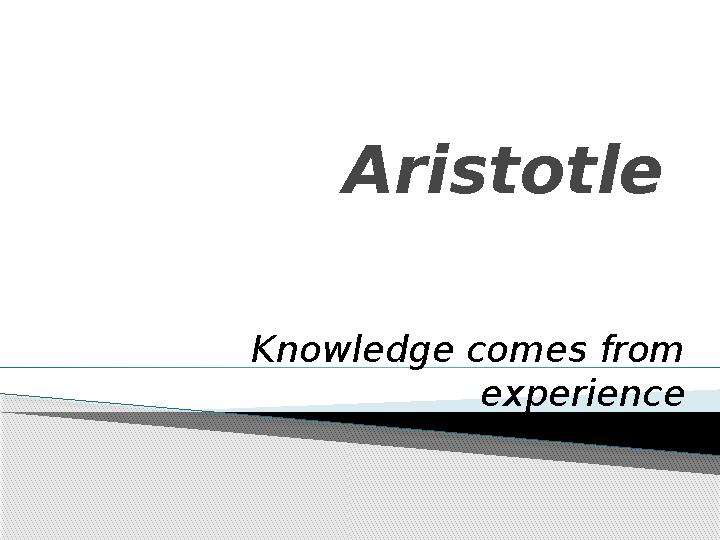



1 слайд
Aristotle
Knowledge comes from
experience
1 слайд
Aristotle Knowledge comes from experience
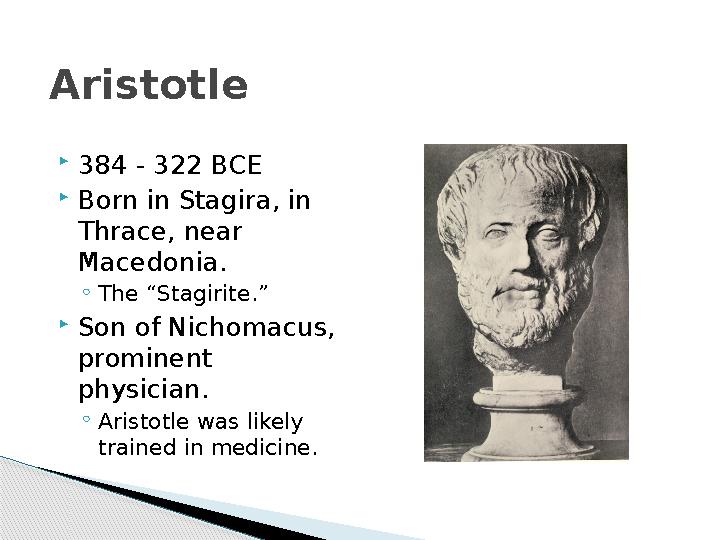
2 слайд
Aristotle
384 - 322 BCE
Born in Stagira, in
Thrace, near
Macedonia.
◦
The “Stagirite.”
Son of Nichomacus,
prominent
physician.
◦
Aristotle was likely
trained in medicine.
2 слайд
Aristotle 384 - 322 BCE Born in Stagira, in Thrace, near Macedonia. ◦ The “Stagirite.” Son of Nichomacus, prominent physician. ◦ Aristotle was likely trained in medicine.
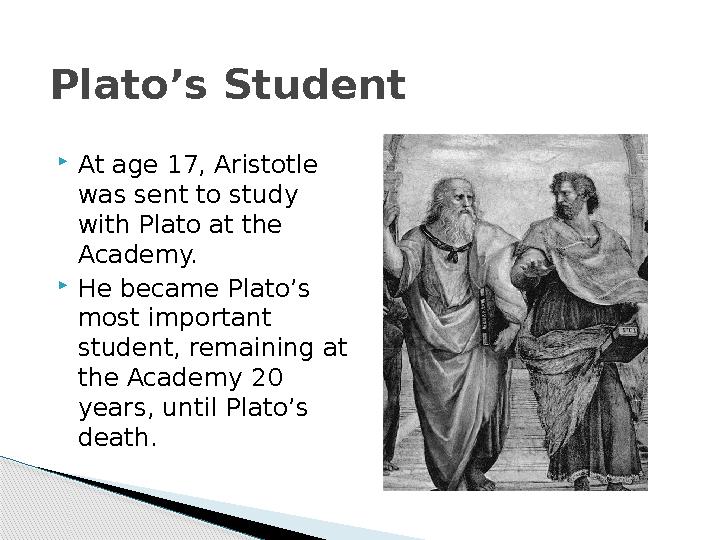
3 слайд
Plato’s Student
At age 17, Aristotle
was sent to study
with Plato at the
Academy.
He became Plato’s
most important
student, remaining at
the Academy 20
years, until Plato’s
death.
3 слайд
Plato’s Student At age 17, Aristotle was sent to study with Plato at the Academy. He became Plato’s most important student, remaining at the Academy 20 years, until Plato’s death.
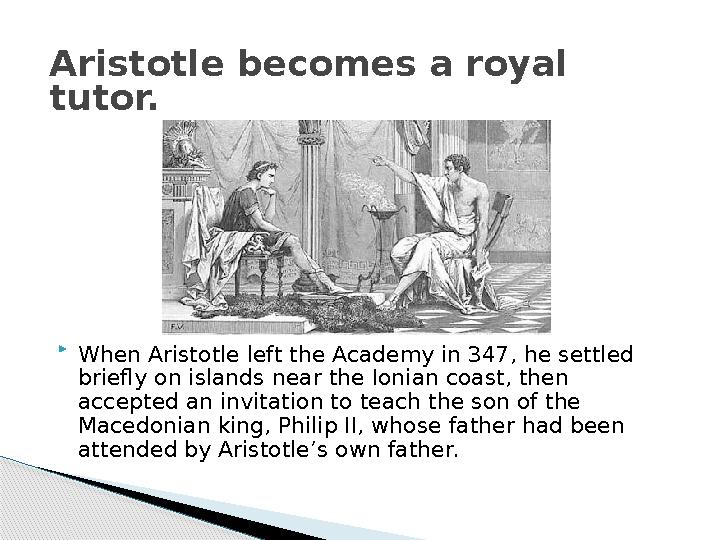
4 слайд
Aristotle becomes a royal
tutor.
When Aristotle left the Academy in 347, he settled
briefly on islands near the Ionian coast, then
accepted an invitation to teach the son of the
Macedonian king, Philip II, whose father had been
attended by Aristotle’s own father.
4 слайд
Aristotle becomes a royal tutor. When Aristotle left the Academy in 347, he settled briefly on islands near the Ionian coast, then accepted an invitation to teach the son of the Macedonian king, Philip II, whose father had been attended by Aristotle’s own father.
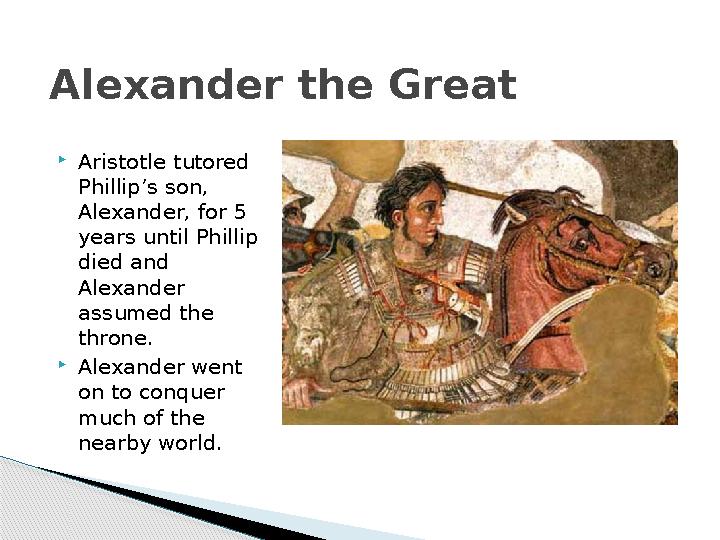
5 слайд
Alexander the Great
Aristotle tutored
Phillip’s son,
Alexander, for 5
years until Phillip
died and
Alexander
assumed the
throne.
Alexander went
on to conquer
much of the
nearby world.
5 слайд
Alexander the Great Aristotle tutored Phillip’s son, Alexander, for 5 years until Phillip died and Alexander assumed the throne. Alexander went on to conquer much of the nearby world.
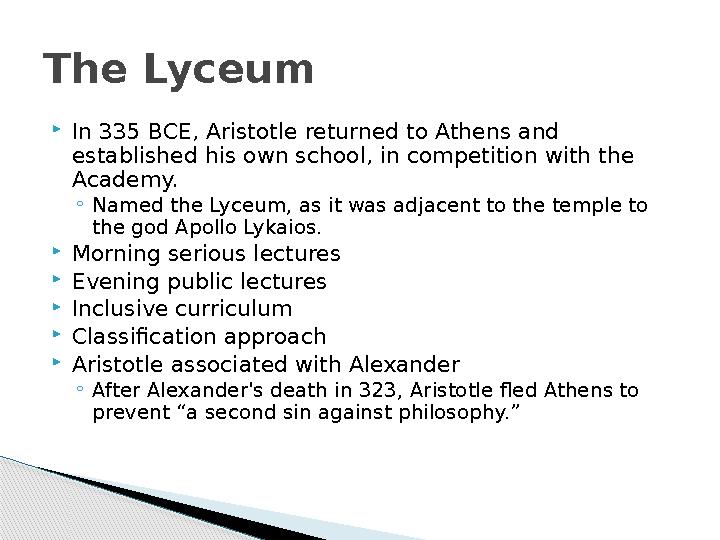
6 слайд
In 335 BCE, Aristotle returned to Athens and
established his own school, in competition with the
Academy.
◦
Named the Lyceum, as it was adjacent to the temple to
the god Apollo Lykaios.
Morning serious lectures
Evening public lectures
Inclusive curriculum
Classification approach
Aristotle associated with Alexander
◦
After Alexander's death in 323, Aristotle fled Athens to
prevent “a second sin against philosophy.”The Lyceum
6 слайд
In 335 BCE, Aristotle returned to Athens and established his own school, in competition with the Academy. ◦ Named the Lyceum, as it was adjacent to the temple to the god Apollo Lykaios. Morning serious lectures Evening public lectures Inclusive curriculum Classification approach Aristotle associated with Alexander ◦ After Alexander's death in 323, Aristotle fled Athens to prevent “a second sin against philosophy.”The Lyceum
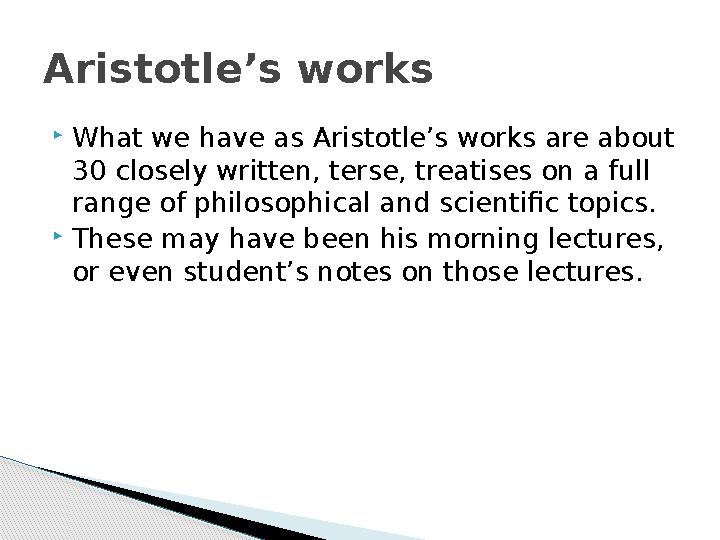
7 слайд
What we have as Aristotle’s works are about
30 closely written, terse, treatises on a full
range of philosophical and scientific topics.
These may have been his morning lectures,
or even student’s notes on those lectures.Aristotle’s works
7 слайд
What we have as Aristotle’s works are about 30 closely written, terse, treatises on a full range of philosophical and scientific topics. These may have been his morning lectures, or even student’s notes on those lectures.Aristotle’s works
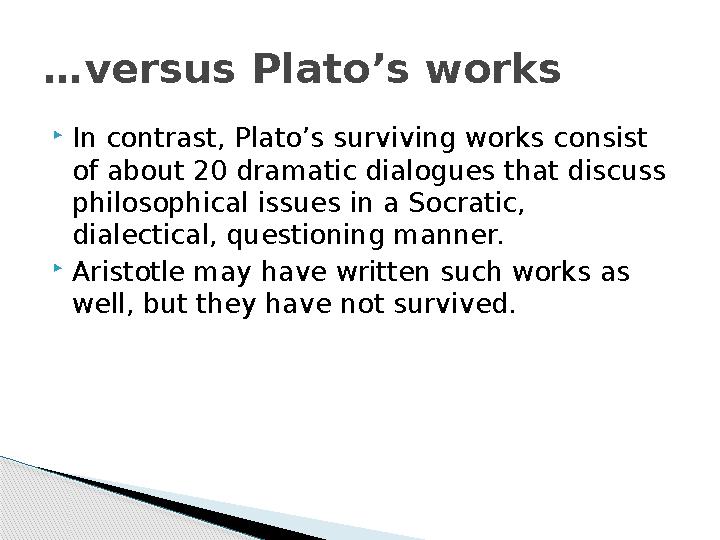
8 слайд
In contrast, Plato’s surviving works consist
of about 20 dramatic dialogues that discuss
philosophical issues in a Socratic,
dialectical, questioning manner.
Aristotle may have written such works as
well, but they have not survived.… versus Plato’s works
8 слайд
In contrast, Plato’s surviving works consist of about 20 dramatic dialogues that discuss philosophical issues in a Socratic, dialectical, questioning manner. Aristotle may have written such works as well, but they have not survived.… versus Plato’s works
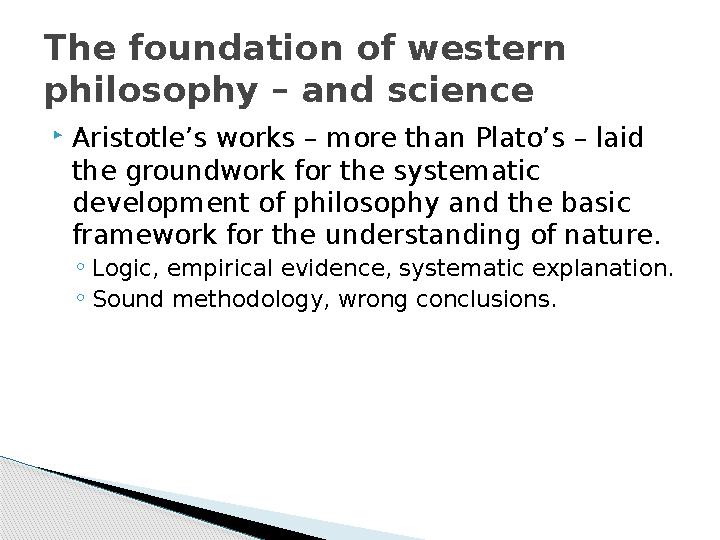
9 слайд
Aristotle’s works – more than Plato’s – laid
the groundwork for the systematic
development of philosophy and the basic
framework for the understanding of nature.
◦
Logic, empirical evidence, systematic explanation.
◦
Sound methodology, wrong conclusions.The foundation of western
philosophy – and science
9 слайд
Aristotle’s works – more than Plato’s – laid the groundwork for the systematic development of philosophy and the basic framework for the understanding of nature. ◦ Logic, empirical evidence, systematic explanation. ◦ Sound methodology, wrong conclusions.The foundation of western philosophy – and science
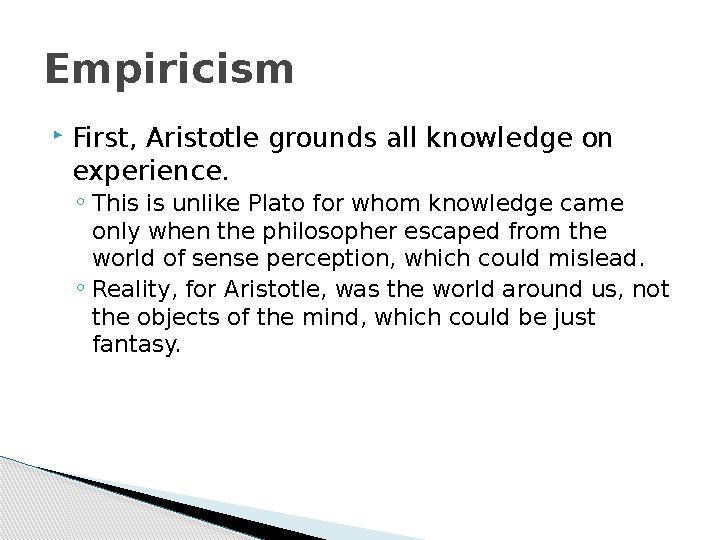
10 слайд
First, Aristotle grounds all knowledge on
experience.
◦
This is unlike Plato for whom knowledge came
only when the philosopher escaped from the
world of sense perception, which could mislead.
◦
Reality, for Aristotle, was the world around us, not
the objects of the mind, which could be just
fantasy.Empiricism
10 слайд
First, Aristotle grounds all knowledge on experience. ◦ This is unlike Plato for whom knowledge came only when the philosopher escaped from the world of sense perception, which could mislead. ◦ Reality, for Aristotle, was the world around us, not the objects of the mind, which could be just fantasy.Empiricism
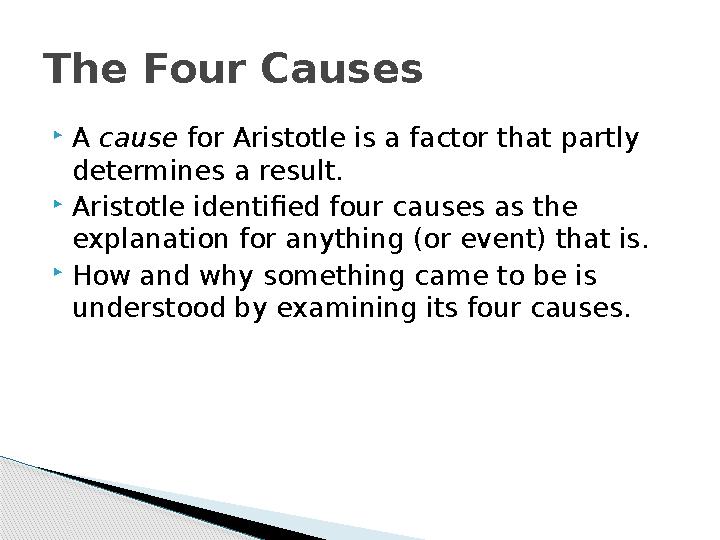
11 слайд
A cause for Aristotle is a factor that partly
determines a result.
Aristotle identified four causes as the
explanation for anything (or event) that is.
How and why something came to be is
understood by examining its four causes.The Four Causes
11 слайд
A cause for Aristotle is a factor that partly determines a result. Aristotle identified four causes as the explanation for anything (or event) that is. How and why something came to be is understood by examining its four causes.The Four Causes
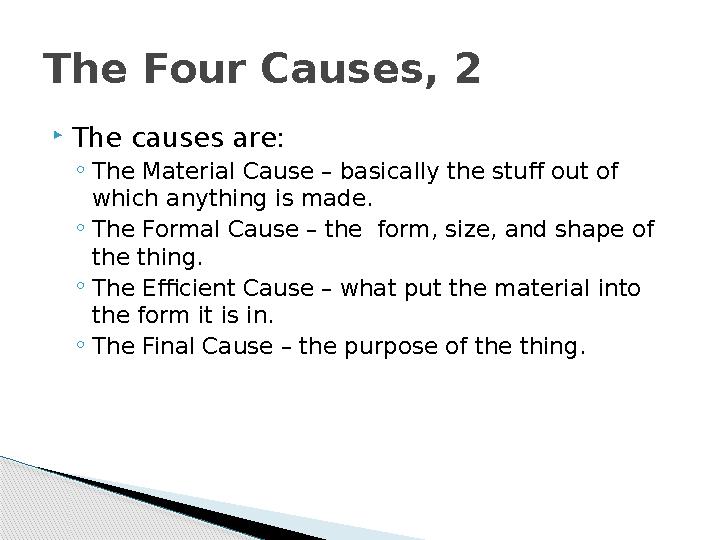
12 слайд
The causes are:
◦
The Material Cause – basically the stuff out of
which anything is made.
◦
The Formal Cause – the form, size, and shape of
the thing.
◦
The Efficient Cause – what put the material into
the form it is in.
◦
The Final Cause – the purpose of the thing.The Four Causes, 2
12 слайд
The causes are: ◦ The Material Cause – basically the stuff out of which anything is made. ◦ The Formal Cause – the form, size, and shape of the thing. ◦ The Efficient Cause – what put the material into the form it is in. ◦ The Final Cause – the purpose of the thing.The Four Causes, 2
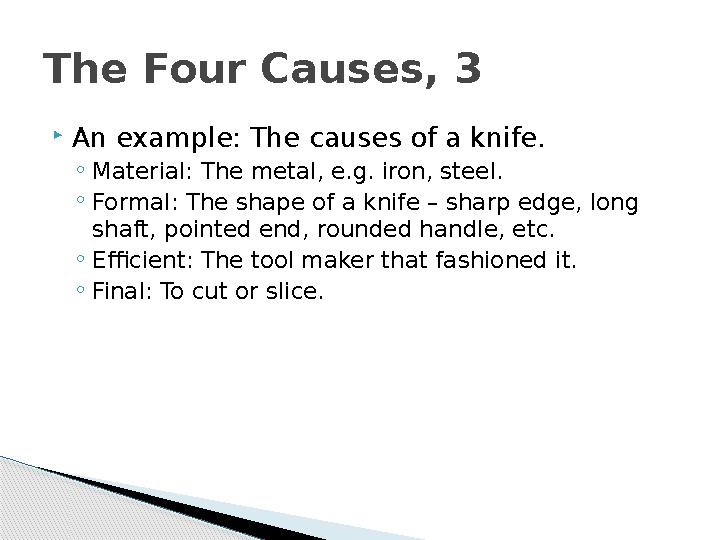
13 слайд
An example: The causes of a knife.
◦
Material: The metal, e.g. iron, steel.
◦
Formal: The shape of a knife – sharp edge, long
shaft, pointed end, rounded handle, etc.
◦
Efficient: The tool maker that fashioned it.
◦
Final: To cut or slice.The Four Causes, 3
13 слайд
An example: The causes of a knife. ◦ Material: The metal, e.g. iron, steel. ◦ Formal: The shape of a knife – sharp edge, long shaft, pointed end, rounded handle, etc. ◦ Efficient: The tool maker that fashioned it. ◦ Final: To cut or slice.The Four Causes, 3
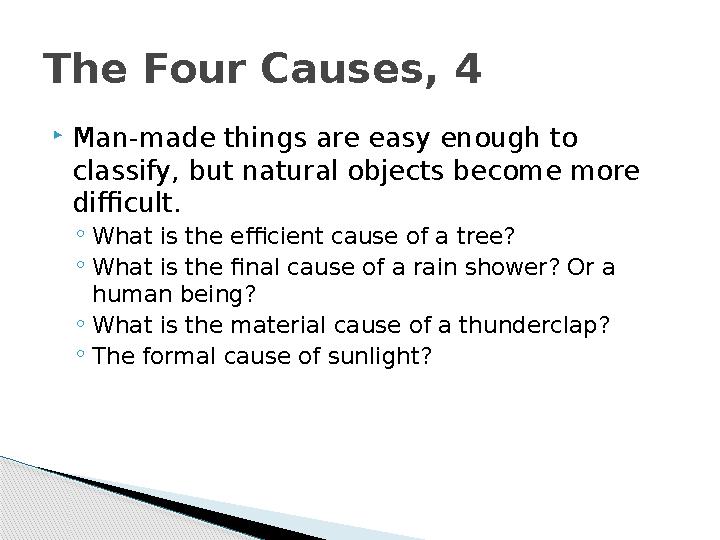
14 слайд
Man-made things are easy enough to
classify, but natural objects become more
difficult.
◦
What is the efficient cause of a tree?
◦
What is the final cause of a rain shower? Or a
human being?
◦
What is the material cause of a thunderclap?
◦
The formal cause of sunlight?The Four Causes, 4
14 слайд
Man-made things are easy enough to classify, but natural objects become more difficult. ◦ What is the efficient cause of a tree? ◦ What is the final cause of a rain shower? Or a human being? ◦ What is the material cause of a thunderclap? ◦ The formal cause of sunlight?The Four Causes, 4
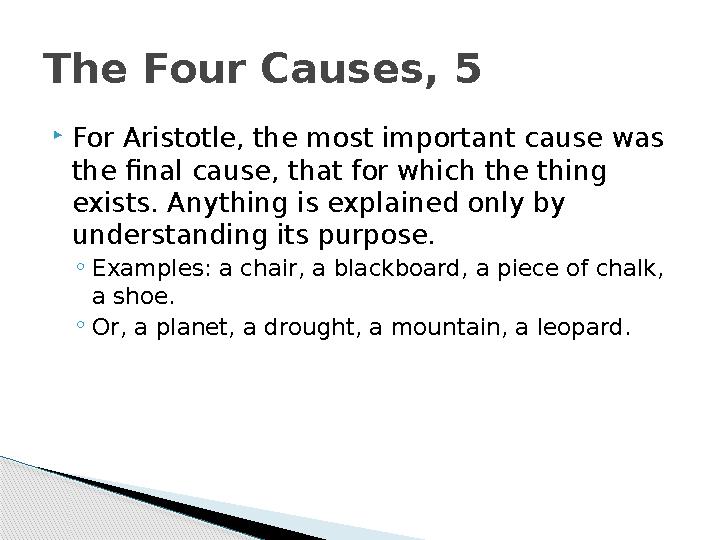
15 слайд
For Aristotle, the most important cause was
the final cause, that for which the thing
exists. Anything is explained only by
understanding its purpose.
◦
Examples: a chair, a blackboard, a piece of chalk,
a shoe.
◦
Or, a planet, a drought, a mountain, a leopard.The Four Causes, 5
15 слайд
For Aristotle, the most important cause was the final cause, that for which the thing exists. Anything is explained only by understanding its purpose. ◦ Examples: a chair, a blackboard, a piece of chalk, a shoe. ◦ Or, a planet, a drought, a mountain, a leopard.The Four Causes, 5
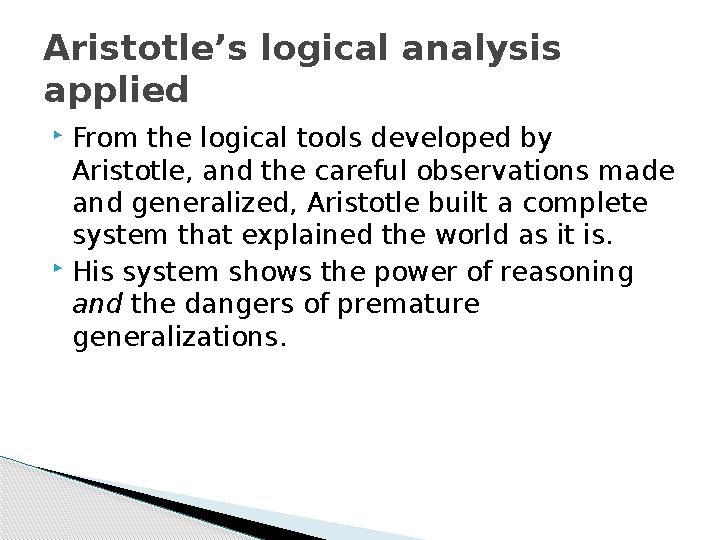
16 слайд
From the logical tools developed by
Aristotle, and the careful observations made
and generalized, Aristotle built a complete
system that explained the world as it is.
His system shows the power of reasoning
and the dangers of premature
generalizations.Aristotle’s logical analysis
applied
16 слайд
From the logical tools developed by Aristotle, and the careful observations made and generalized, Aristotle built a complete system that explained the world as it is. His system shows the power of reasoning and the dangers of premature generalizations.Aristotle’s logical analysis applied
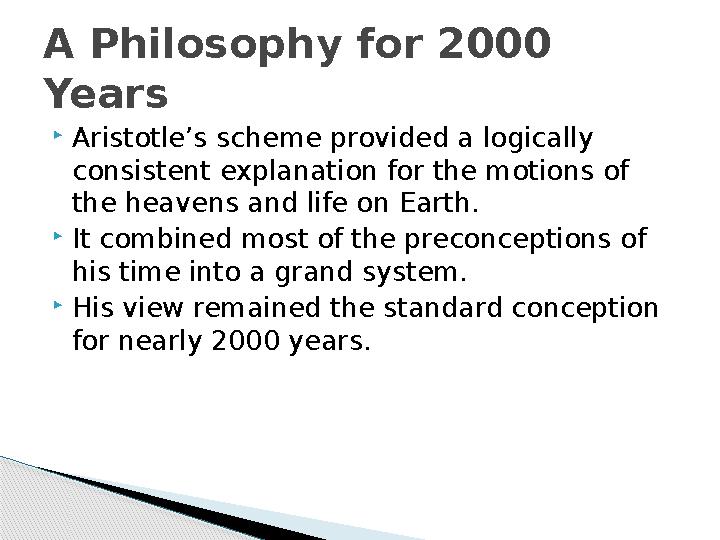
17 слайд
Aristotle’s scheme provided a logically
consistent explanation for the motions of
the heavens and life on Earth.
It combined most of the preconceptions of
his time into a grand system.
His view remained the standard conception
for nearly 2000 years.A Philosophy for 2000
Years
17 слайд
Aristotle’s scheme provided a logically consistent explanation for the motions of the heavens and life on Earth. It combined most of the preconceptions of his time into a grand system. His view remained the standard conception for nearly 2000 years.A Philosophy for 2000 Years















